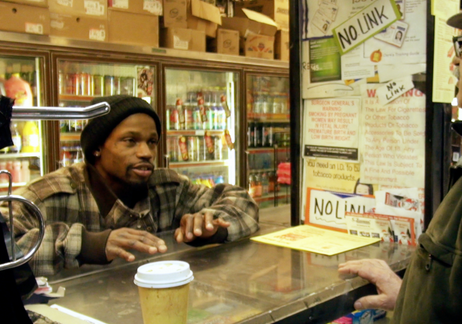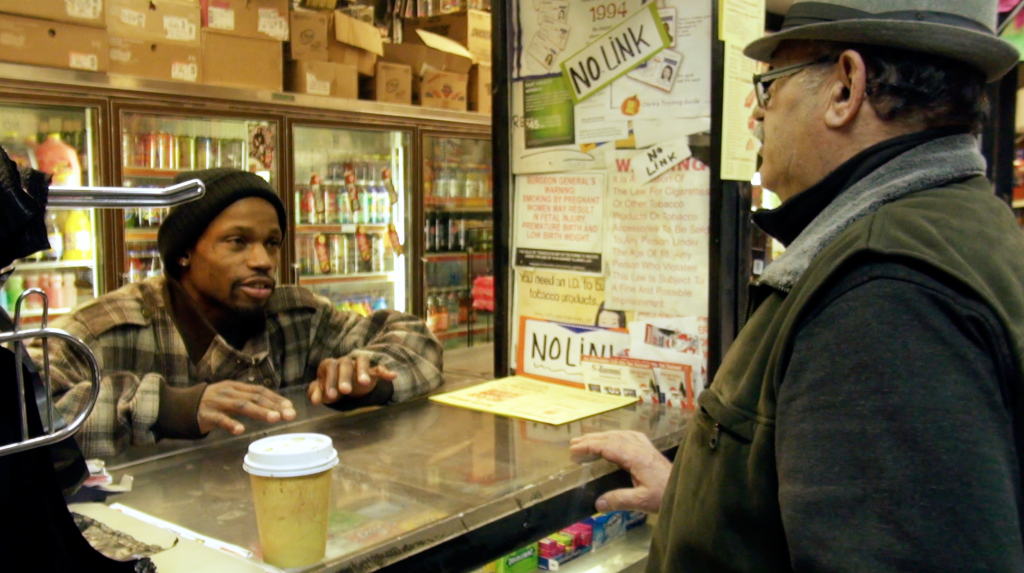The organizers of the Chicago Palestine Film Festival prefaced their screening of Amina Waheed’s Corner Stores with a warning: “We are committed to showing films which start conversations, even if they generate controversy.” Waheed’s film is a portrait of Palestinian refugee Falah Farhoudeh, who owns a corner store in Englewood and is known to his customers and friends as Abu Muhammad.
Farhoudeh is one of many Arab shop owners in the predominantly black area—besides Palestinians, there are also populations of Jordanians and Egyptians—but his store stands apart as a community hub. Tensions between the Arab-American shop owners and the black South Side communities they serve attracted attention from outside the neighborhood with the 2010 release of Mikkey Halsted’s wrathful single “Liquor Store.”
But it was the screening’s second film, Under the Same Sun—a cartoonish portrayal of an Israeli-Palestinian business partnership that manages to inspire a peaceful two-state solution—that drew controversy and criticism. The films were likely paired together because, in the broadest sense, they deal with similar themes: the way economic interaction presents both risks and opportunities for connection across cultural and political divisions. Under the Same Sun served as a reminder that there are real stakes to the representations of these divisions, even when they are fictional.
Viewing the two films in sequence brought the achievements of Waheed’s into relief: Corner Stores is hopeful, but (unlike in the second film’s politically questionable fantasy) its hope is embodied in the way Farhoudeh and his customers act and speak, while nonetheless acknowledging the relative bleakness of their circumstances. Without commentary, we are shown empty storefronts, wilting vegetables, and shots of the Chicago skyline from afar. “It’s about not forgetting you’re in Chicago,” Waheed said in an interview. “Also to show that we’re not too far from these epic city centers where all the big money goes.”
In Halsted’s song, corner stores are depicted as oases of junk in a food desert (“For breakfast they serve us flaming hot Cheetos and honey buns / No wonder why we die so young”) staffed by hypocrites (“If he follow the Qur’an, why the fuck he sell bacon?”) and exploiters (“You a leech on the black neck”). This negative portrayal generated some positive press: the song was mentioned in a report from National Public Radio on the Inner City Muslim Action Network (IMAN) and their “Muslim Run” campaign, an initiative that seeks to address racial and ethnic tensions as well as unhealthy food options at these South Side stores. Ongoing since 2007, the campaign was selected last month as a delegate agency and partner of the City of Chicago in their citywide Healthy Corner Store pilot project.
Waheed is knowledgeable about the political and economic context of the specific story she’s telling—she was introduced to Farhoudeh by Shamar Hemphill, IMAN’s Youth and Organizing Director, whom she worked with in Englewood after graduating from college. It was while working on the South Side that Waheed became interested in journalism. “I was hearing incredible stories in Englewood, stories of perseverance. I was really inspired,” she says. She began producing “audio portraits” in Chicago before traveling to the West Bank for several months. There, she encountered many documentarians, and her work “started to become more of a reality.”
Once in graduate school for journalism at University of California, Berkeley, Waheed began thinking about a project that would investigate the “intersections of communities,” focusing on Yemeni-owned corner stores in Oakland as examples of the “nodes where [communities] meet.” In a follow-up Q&A at the Chicago Palestine Film Festival, she said Spike Lee’s Do The Right Thing inspired her to provoke a “raw conversation about race.” But her research in Chicago led her to make a different kind of film.
“Before it came to be about Abu Muhammad, it was also in large part about how the immigrant communities came to take over some ninety percent of the businesses,” says Waheed. “They used to call it the Black Wall Street, with predominantly African-American business owners in these black neighborhoods. I was digging and looking into it, but I thought this was more interesting.” Waheed’s experience working with the community enabled her to observe the subtleties of the present-day atmosphere created by these historical trends.
“So often as journalists we parachute in on stories. And there’s a balance: stories need to be told somehow. Sometimes you parachute in, but it always is a lot better when you keep up with stuff. It means more to the community when you do that,” she says. “Remaining objective, but embedding yourself.”
The history and politics are mostly present as undertones in Waheed’s final work. The majority of the film consists of footage from Farhoudeh’s life at the store—he watches the news in Arabic, jokes with his customers, allows them to keep tabs and pay him back later. Waheed’s camera moves around the small store, scanning the shelves or recording from behind the counter. “He just sort of went about his day,” Waheed says. “We were honest with each other. I could tell when he was tired of having me carrying my camera.”
Farhoudeh’s strong relationships with his customers also helped assure them that Waheed was not putting them in any danger. “People are always a little wary, because they associate the camera with law enforcement. Even when customers were scared of the camera, he would make a joke out of it,” Waheed says. “He would say, ‘Yeah, she’s with the police, better watch out for her!’ They would laugh, and I would explain who I was and keep filming.”
Waheed introduces us to Farhoudeh’s neighbors. Peaches, a local rapper, talks about a store that’s far different from Mikkey Halsted’s. The owner of a local barbershop recites the Arabic swear words Farhoudeh has taught him. Charles, an employee of Farhoudeh’s, describes how his boss generously helped him clear his record. Near the end of the film, Farhoudeh locks up the store and goes to pick up his daughter. “You’re constantly negotiating people’s boundaries, and a lot of that comes from building trust,” Waheed says. “Eventually I said, ‘This is an important part of your life. Let’s meet your family.’”
When his wife is introduced, it’s a bit of a reveal: “It’s really special when [the audience is] not expecting it. This Arab corner store-owner has an African-American wife, married into the community. It actually happens more frequently than we’d think,” Waheed explains. The couple initially connected over their shared Muslim faith, and we see Farhoudeh praying and watching the latest news from Palestine. His wife explains that he is often glued to the TV, but that it does not bother her: Farhoudeh has no immediate family other than her and their children, and following the Palestinian story is a way for him to maintain a connection.
One audience member at the festival asked whether Waheed believed that Farhoudeh elicited respect and friendship from his customers because they knew he had a black wife. Waheed’s reply—“it matters and it doesn’t”—was a reminder that the real story is always more complicated. We can try to fit Farhoudeh’s narrative into one we already recognize, with an ending we understand. We cast him as the hero who makes the crucial gesture, healing a divided community. But Corner Stores confronts and resists these attempts to treat its subjects as symbols; a dynamic, it seems, Abu Mohammad and his customers also engage in with one another.



